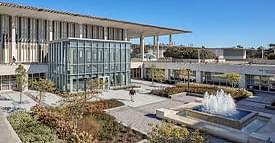Bachelor of Science [B.S] (Chemical and Biochemical Engineering)
Field of Study:
₹30 L/Yr
The practice of chemical engineering draws from the fundamentals of biology, chemistry, mathematics, and physics. Accordingly, undergraduate students must initially complete a program of study that stresses these basic fields of science. Chemical engineering coursework blends these four disciplines into a series of engineering fundamentals relating to how materials are produced and processed both in the laboratory and in large industrial-scale facilities. Courses such as fluid mechanics, heat and mass transfer, thermodynamics, reaction kinetics, and chemical process control are at the heart of the chemical engineering curriculum at Mines. In addition, it is becoming increasingly important for engineers to understand how biological and microscopic, molecular-level properties can influence the macroscopic behavior of materials, biological, and chemical systems. This somewhat unique focus is first introduced at Mines through the physical and organic chemistry sequences, and the theme is continued and developed within the chemical engineering curriculum via material and projects introduced in advanced courses. Our undergraduate program at Mines is exemplified by intensive integration of computer-aided simulation and computer-aided process modeling in the curriculum and by our unique approach to teaching of the unit operations laboratory sequence. The unit operations lab course is offered only in the summer as a 6-week intensive session. Here, the fundamentals of heat, mass, and momentum transfer and applied thermodynamics are reviewed in a practical, applications-oriented setting. The important skills of teamwork, critical thinking, time management, and oral and written technical communications skills are also stressed in this course.
Facilities for the study of chemical and biological engineering at the Colorado School of Mines are among the best in the nation. Our modern in-house computer laboratories support nearly 70 workstations for students to use in completing their assigned coursework. In addition, specialized undergraduate laboratory facilities exist for studying polymer properties, measuring reaction kinetics, characterizing transport phenomena, and for studying several typical chemical unit operations. Our honors undergraduate research program is open to highly qualified students and provides our undergraduates with the opportunity to carry out independent research or to join a graduate research team. This program has been highly successful and our undergraduate chemical engineering students have won several national competitions and awards based on research conducted while pursuing their baccalaureate degrees. We also have a cooperative (Co-Op) education program in which students can earn course credit while gaining work experience in industry.

1546425900.png?h=48&w=101&mode=stretch)
Do you think the Rankings are wrong ? Report Here
TOP Scholarships
| Scholarship name | Award amount | Eligibility |
|---|---|---|
| - | - | - |
| - | - | - |
| - | - | - |
Key Resources for Your Study Abroad Journey
Scholarship Grants & Financial Aids
| Name | Scholarship Per Student | Level of Study | Type | |
|---|---|---|---|---|
| Debesh Kamal Scholarship | Scholarship per student₹ 1.2 L/Yr$1,385 | Level Of StudyBachelor | TypeMerit-Based | |
| Ritchie-Jennings Memorial Scholarship Program | Scholarship per studentVariable Amount | Level Of StudyBachelor | TypeMerit-Based | |
| VueVille Future Technology Scholarship | Scholarship per student₹ 85,940/Yr$1,000 | Level Of StudyBachelor | TypeMerit-Based | |
| Innovation in Education Scholarship - La Tutors 123 | Scholarship per student₹ 42,970/Yr$500 | Level Of StudyBachelor | TypeMerit-Based | |
| RD Sethna Scholarships | Scholarship per student₹ 12.9 L/Yr$15,000 | Level Of StudyBachelor | TypeMerit-Based | |
| Deutschland Stipendium Program | Scholarship per student₹ 3.7 L/Yr$4,363 | Level Of StudyBachelor | TypeCollege-Specific |
Similar Colleges


University at Albany


Northern State University


Abilene Christian University
.jpeg?h=143&mode=stretch)

Ohio Northern University


University of South Carolina


University of Akron


State University of New York Polytechnic Institute


University of New Mexico




























Comments